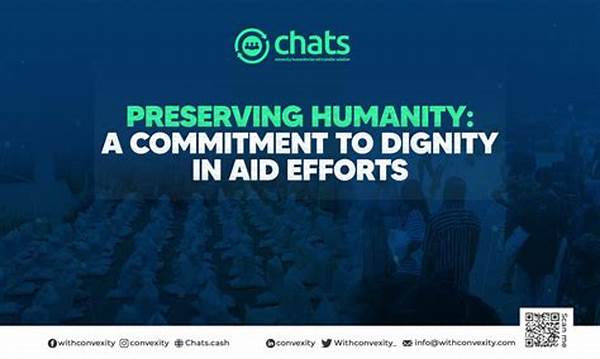In the realm of humanitarian assistance, a paramount objective is to address the immediate needs of those affected by crises while upholding their inherent dignity. The concept of protecting dignity in aid efforts is foundational, ensuring that individuals do not merely receive assistance, but do so in a manner that respects their intrinsic worth and humanity.
Importance of Dignity in Humanitarian Assistance
Every person deserves to be treated with respect and dignity, irrespective of the circumstances they face. In humanitarian contexts, where people are often at their most vulnerable, it is crucial that aid organizations prioritize protecting dignity in aid efforts. This approach not only fosters a sense of self-worth among those receiving aid but also encourages active participation and engagement, promoting more effective and sustainable outcomes. By instilling dignity into aid delivery, we acknowledge beneficiaries as partners in recovery rather than passive recipients, thus reinforcing their agency and resilience.
Moreover, protecting dignity in aid efforts helps mitigate the potential for feelings of shame or helplessness that can accompany the receiving of assistance. When individuals are treated with dignity, they are more likely to maintain a positive outlook and a proactive stance, which are essential for recovery and rebuilding their lives. This is particularly important in prolonged crises, where long-term support and collaboration are vital for restoring normalcy and fostering hope.
Strategies for Upholding Dignity
One effective strategy for protecting dignity in aid efforts is adopting a participatory approach, involving beneficiaries in decision-making processes to tailor interventions to their actual needs and circumstances. Comprehensive cultural sensitivity training for aid workers plays a critical role in ensuring respectful interactions with communities. Another key aspect is transparent communication, which fosters trust and helps manage expectations.
Utilizing technology to provide fast and accurate assistance, while respecting privacy and confidentiality, is another way to uphold dignity. Additionally, providing aid in a nondiscriminatory manner ensures equal access for all, irrespective of gender, age, or ethnicity. Aid efforts also benefit from maintaining open feedback channels to gauge recipients’ satisfaction, allowing for timely adjustments to aid programs. Regular monitoring and evaluation help ensure the continuous improvement of aid efforts. Capacity-building activities focused on strengthening local infrastructures further empower communities, enhancing dignity and resilience.
Challenges in Protecting Dignity
Despite its importance, protecting dignity in aid efforts presents several challenges. The urgency and scale of many humanitarian crises can lead to oversights in preserving dignity. High-pressure environments may compromise tailored, dignified interventions. Additionally, resource constraints often necessitate prioritization, sometimes leading to inadequate attention to the qualitative aspects of aid delivery.
Another obstacle is the cultural differences between aid workers and recipients, which can create misunderstandings or perceived disrespect. Training programs and collaboration with local partners can help overcome these challenges. Aid organizations must continuously adapt their strategies to address these challenges, ensuring the protection of dignity remains at the forefront of their efforts.
Collaborative Solutions for Upholding Dignity
Effective collaboration between international organizations, local governments, and communities is essential for protecting dignity in aid efforts. Establishing partnerships with local organizations ensures that aid reflects the actual needs and cultural nuances of the community. Such partnerships enable a more grassroots approach, fostering trust and sustainability.
Furthermore, engaging with community leaders and embracing local knowledge enhances the cultural relevance of aid efforts. By leveraging the strengths of diverse stakeholders, interventions can be more holistic and respectful. Community-based monitoring systems, established through these collaborations, provide an additional layer of accountability, ensuring that aid delivery remains dignified and contextually appropriate.
Ethical Frameworks in Aid Delivery
The application of ethical frameworks is central to protecting dignity in aid efforts. These frameworks guide humanitarian actors in balancing urgency with respect for ethical considerations. The principled approach advocated by organizations such as the International Red Cross emphasizes humanity, impartiality, neutrality, and independence.
Adhering to these ethical frameworks ensures that aid is administered without discrimination, prioritizing those most in need while upholding their dignity. Establishing codes of conduct reflecting these principles helps standardize respectful interactions in various contexts. Through regular training, dissemination of best practices, and ethical oversight, organizations can significantly enhance their ability to protect and uphold dignity during aid initiatives.
Monitoring and Evaluation for Dignity
Rigorous monitoring and evaluation processes are critical to protecting dignity in aid efforts. Establishing clear metrics and feedback mechanisms enables organizations to assess not only the efficiency but also the effectiveness and respectfulness of aid delivery. Regular reviews of interventions ensure alignment with dignity-preserving principles.
Engaging beneficiaries in these evaluation processes fosters transparency and accountability while providing insights into real-world challenges and successes. Learnings from these evaluations inform continual improvement of dignity-focused approaches. By integrating these insights into future planning, aid organizations can better uphold dignity and enhance the overall impact of their efforts.
Summary
In conclusion, the emphasis on protecting dignity in aid efforts acknowledges the holistic needs of those affected by crises, ensuring assistance is both effective and respectful. Upholding dignity in humanitarian aid helps foster resilience and empowerment, paving the way for sustainable recovery and development. Despite the challenges and constraints, a continued focus on dignity is vital for humanitarian effectiveness.
By embracing collaborative approaches, ethical frameworks, and continuous learning, aid organizations can successfully integrate dignity into their operations. Protecting dignity in aid efforts is not only an ethical imperative but also a practical necessity, guiding the humanitarian community towards more humane and impactful interventions.





